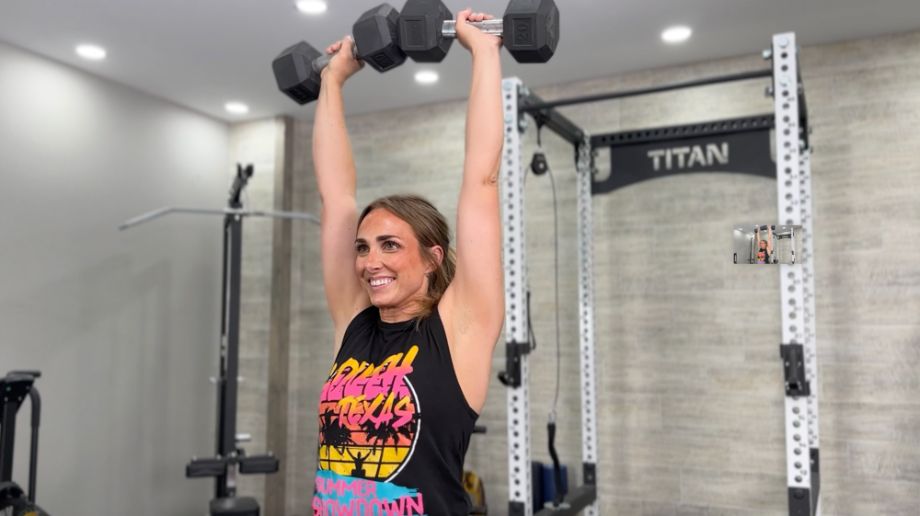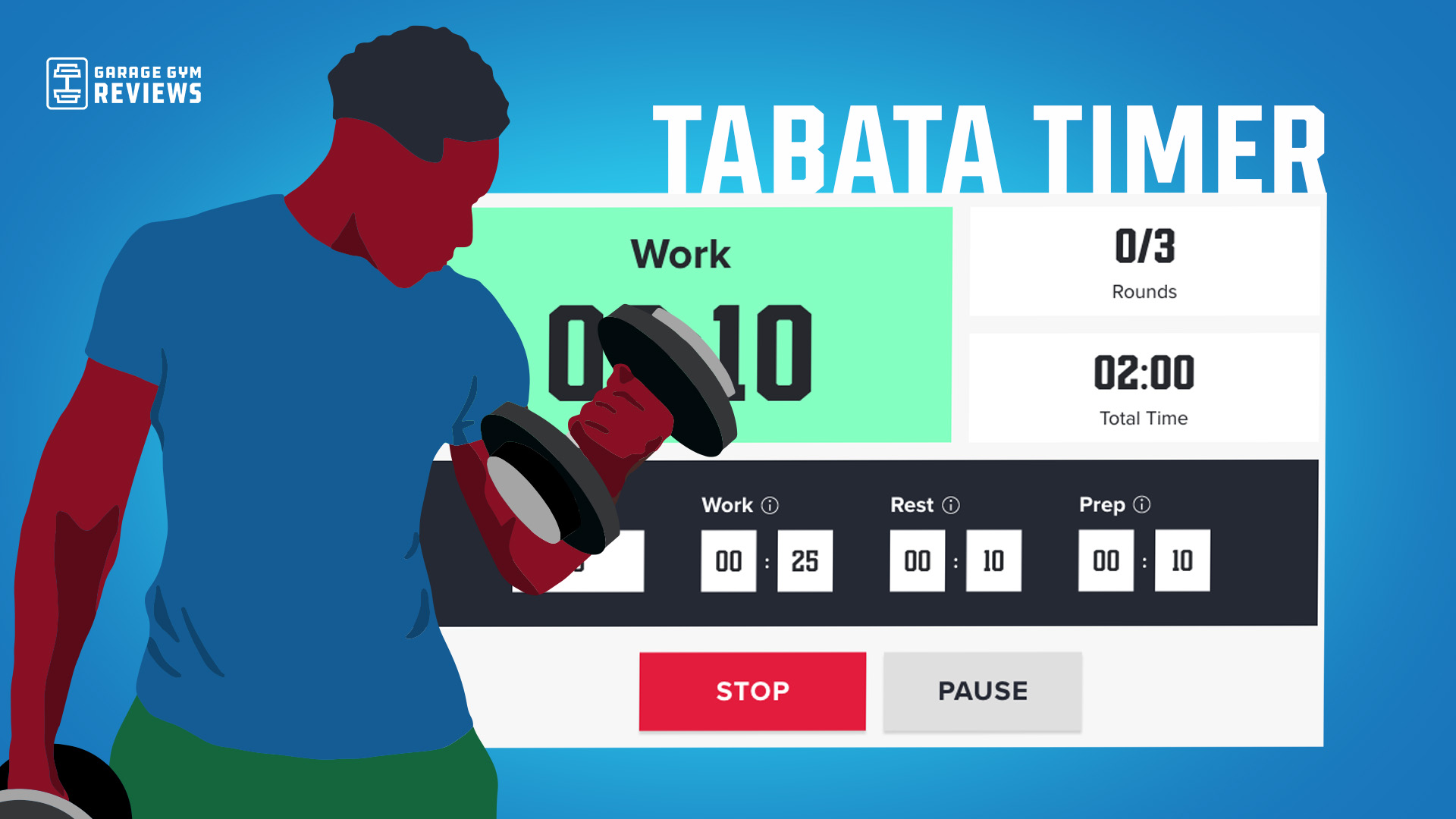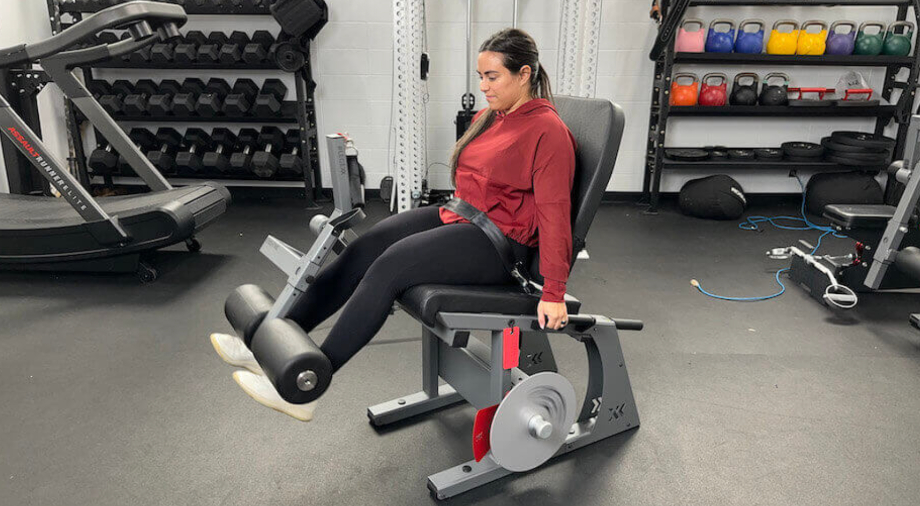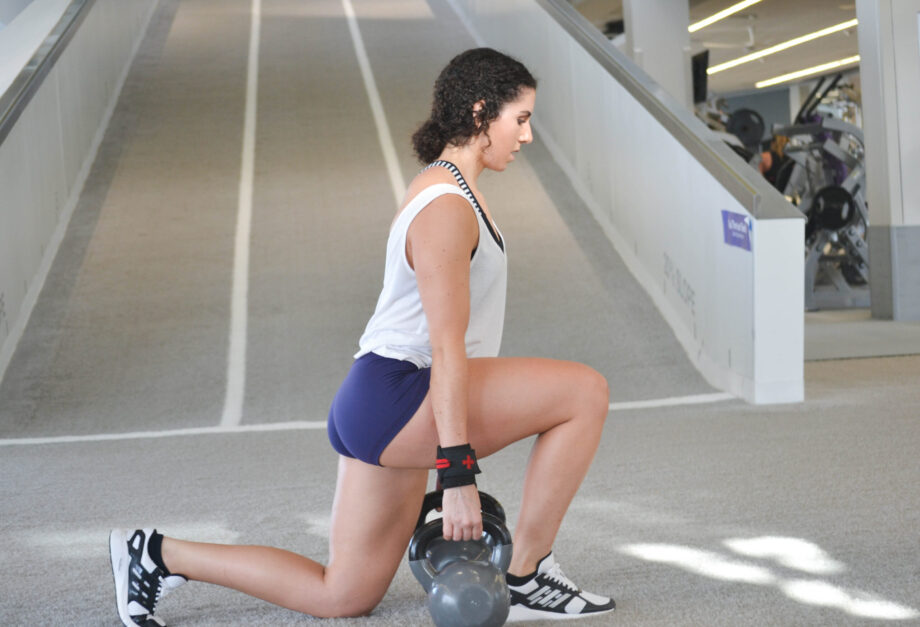The strict overhead press is the gold standard of overhead pressing because the entire focus is on the upper body to get the weight overhead. Now, this is great, but how often does this happen in life outside the gym? Not often, which is why the push press exercise is a better fit for many lifters.
RELATED: Upper Body Workout At Home
The push press exercise, performed with a barbell, kettlebell, or dumbbell, uses a lower body dip to assist you in pressing overhead, which has a few immediate benefits. It allows you to use more weight and trains more overall muscle because the lower body is involved. The push press translates well to real life and is a great accessory exercise for the Olympic lifts because it improves overhead strength.
RELATED: Thrusters Workout
Here, I’ll get into all things push press exercise so you can reap the benefits of this awesome exercise.
How To Push Press
Here is how to perform the barbell push press with proper form:
- Set the barbell in the squat or power rack at just below shoulder height.
- Grip the barbell with a shoulder-width overhand grip, barbell in the heel of your palm, wrist neutral, and wrist and shoulder aligned.
- Unrack the barbell and walk back a few steps.
- Keep your shoulders down and chest up as you dip downwards about four to six inches while driving your knees over your toes.
- Then, use your quads and glutes to drive yourself while pushing the barbell overhead till lockout.
- Slowly lower to the starting position and reset and repeat for desired repetitions.
Note: Described above is the barbell push press, but it can be performed with dumbbells, kettlebells, and even a resistance band.
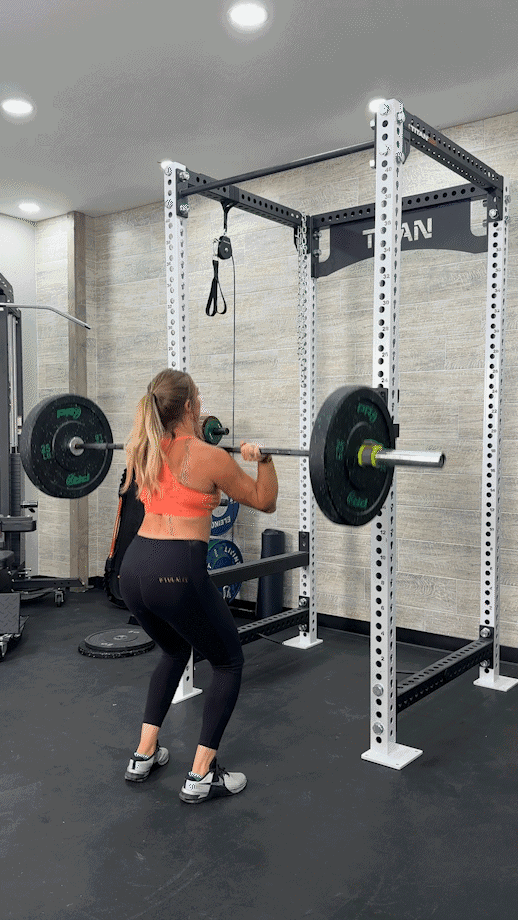
Trainer Tips for Form
The push press exercise is similar to the overhead press exercise except for the lower body dip, and nearly everything needed for the best overhead press form also applies to the push press. Here are a few tips from a CPT on proper push press form.
Good Starting Position
The key to nailing good form with most strength training exercises lies in getting the starting position nailed down, and the push press is no exception. Getting a wider-than-shoulder-width grip, wrist neutral, and elbows directly underneath your wrists allows for a straighter pressing path.
RELATED: Types of Strength Training
Think Of It As One Movement
The push press is two separate movements in one: the quarter squat and then the overhead press. When coming up from the quarter squat, you should begin the overhead press to harness your lower body’s power to lift heavier weights overhead.
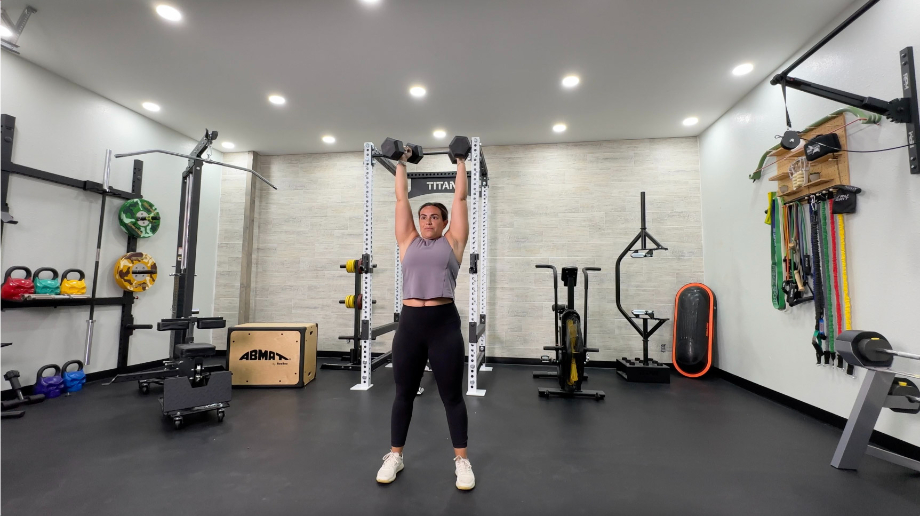
Lock It In
Minimizing lower back hyperextension is vital with the push press, so ensure you’re squeezing your glutes at lockout and engaging your anterior core to prevent rib flaring. Both will help keep the press and the lowering of the weight in more of a straight line.
RELATED: Hyperextension Exercise
Push Press Benefits
The push press is the exercise for you if you like boulder shoulders and well-defined triceps. Here are three other benefits of adding the push press in your strength training routine.
Builds More Strength and Muscle
Using your knees and glutes to drive the weight overhead provides strength and hypertrophy to your quads and glutes. Lifting more weight overhead compared to the strict overhead press will assist you in building bigger pecs, deltoids, and triceps.
Improves Other Pressing Exercises
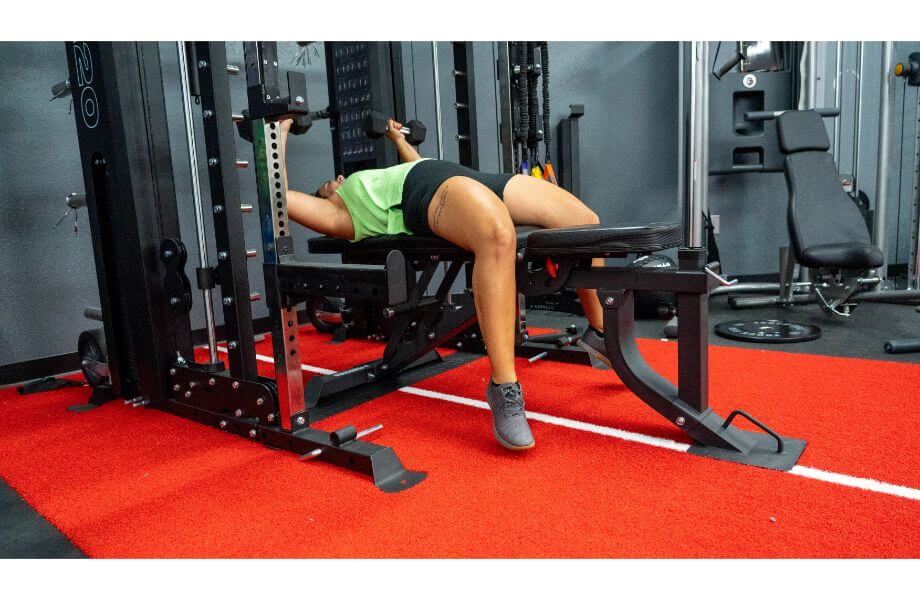
The primary benefit of the push press is being able to press more overhead than the strict press. This ability to lift more directly carries over to your bench press because they train similar muscles. If you dabble in the Olympic lifts, the push press is a great accessory exercise for building more overhead strength for the clean and jerk, and snatch.
Increased Full-Body Power
Glutes and quad drive in the push press are crucial in improving leg power in other activities such as running, sprinting, and jumping. Power transfer from the lower to the upper body mimics what many overhead athletes perform on the sporting field—for instance, a CrossFit athlete and a tennis player serving.
RELATED: CrossFit Exercises
Common Push Press Mistakes
The push press is an excellent full-body exercise incorporating lower-body power to improve upper-body strength and power. However, mistakes can be made as the push press requires coordination and timing. Here are a few common mistakes to avoid so you can get the best out of this compound movement.
Not Using Momentum
Dr. Allan Bacon, Ph.D., owner of Maui Athletics, finds lifters missing the point of the push press.
“I see people will often make the mistake of performing a push jerk instead of a push press. Rather than using momentum and shoulder strength to drive the weight up completely, they dip under the ascending bar and end up jerking the weight instead of push-pressing,” explains Bacon.
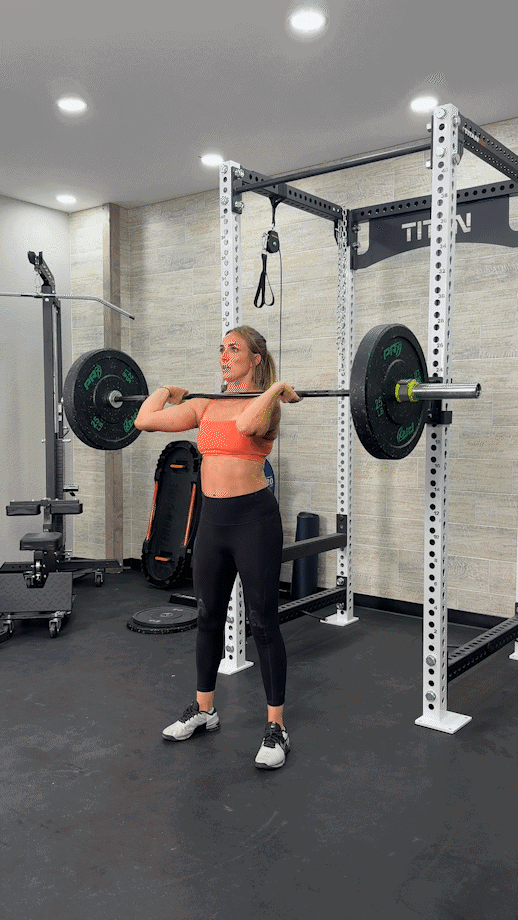
Pressing Too Far Forward
A bad habit when you start to push press is pressing the weight up and out away from your body instead of straight up. This will limit your weight and place strain on your shoulder joint. Ensure you’re moving your head backward during the press so the bar can travel in a vertical line.
Timing
The push press is an overhead press, but the prime movers for the leg drive are your quads and glutes. As such, you must initiate the movement with your legs and not your arms. Performing the quarter squat should create enough momentum for the barbell to explode off your shoulders and pass overhead before your chest, triceps, and shoulders kick in.
RELATED: Get Pumped With This Chest, Shoulder, And Triceps Workout
Push Press Variations
Exercise variations give the body a different stimulus to improve muscular development, prevent training boredom, and overuse injury. Here are four such push-press variations for your shoulder training pleasure.
Dumbbell Push Press
Why do it: The dumbbell push press is easier on your upper body joints because of the ability to hold them with a neutral wrist. Plus, you’ll strengthen imbalances between sides because you technically lift each weight separately.
How to do it:
- Curl two dumbbells to your front deltoids and get your shoulders down and chest up.
- Dip your knees four to six inches over your toes.
- Explode up, using your legs to press the dumbbells overhead.
- Once the dumbbells are locked out overhead, slowly lower to the starting position, reset, and repeat for desired reps.
RELATED: Best Dumbbells
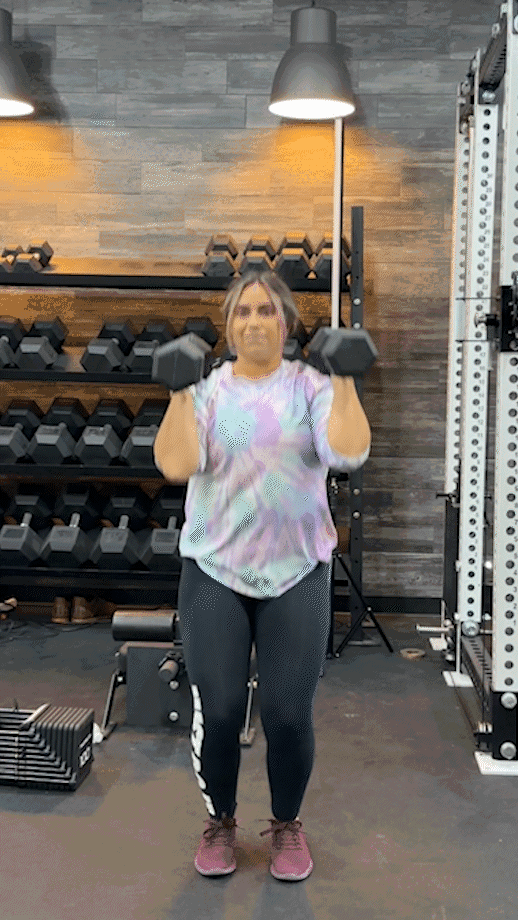
Arnold Press
Why do it: The Arnold press’s rotational nature and the extensive range of motion help increase time under tension for all three deltoid muscles.
How to do it:
- Sit down, kick the dumbbells up, and rotate your hands until your palms face your anterior delts.
- With your shoulders down and chest up, press and rotate your palms to face forward.
- Lift until your biceps are by or behind your ears.
- Pause and reverse to the starting position, then reset and repeat for desired reps.
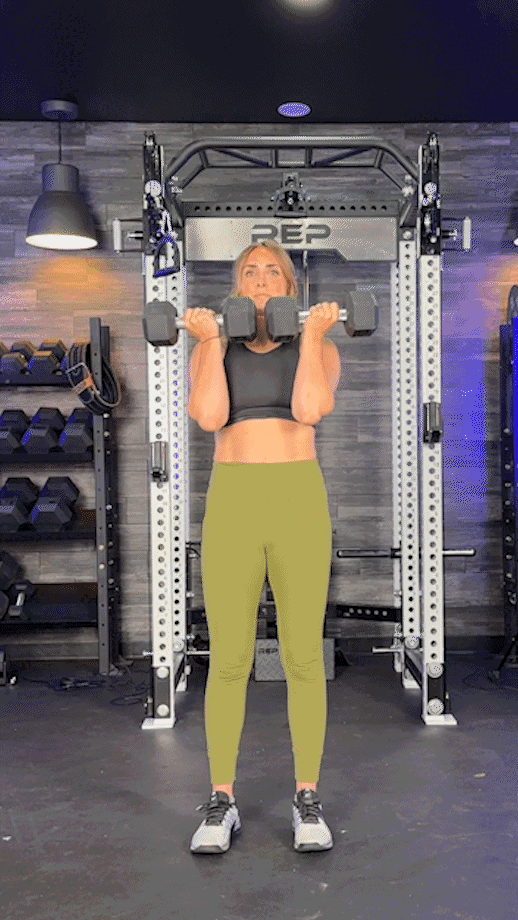
Strict Press
Why do it: The strict overhead press (military press) focuses more muscular tension on the shoulders, chest, triceps, and upper back due to the lack of lower body drive.
How to do it:
- In a standing or seated position, grip the barbell with an overhand grip in front of your shoulders in the squat or power rack.
- Place your hands outside of shoulder width, ensure your elbows and forearms are straight, and your wrist is neutral.
- Press overhead until lockout with your biceps by or behind your ears.
- Lower to the rack position, reset, and repeat for desired reps.
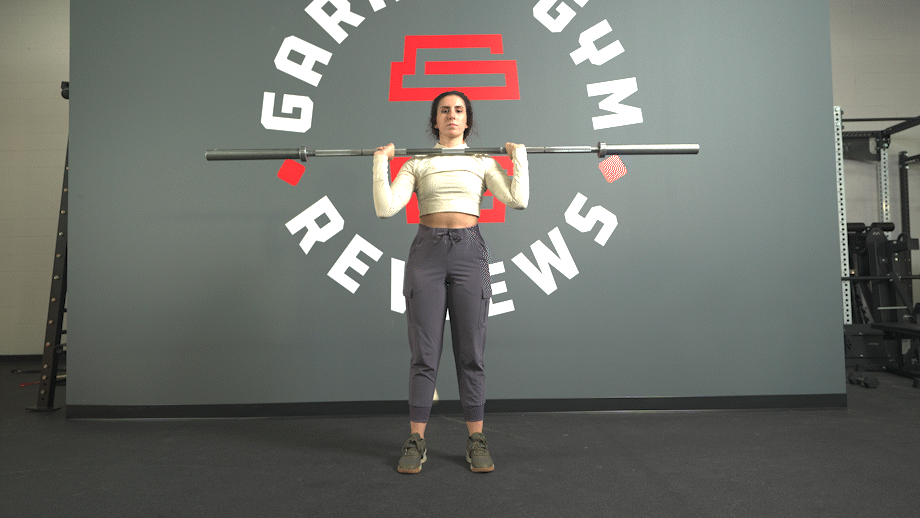
Z-Press
Why do it: The Z-Press takes the legs out of the equation, and your core stability picks up the slack to assist you by pressing the weight overhead for improved core strength and press form.
How to do it:
- Sit down with an upright upper body and legs extended in a V-shape in front of a squat rack with a barbell at shoulder height.
- Unrack the barbell with the barbell in the heel of your palms, wrist neutral, and elbow underneath with a wider than shoulder-width grip.
- Brace your core, tighten your upper back, and press overhead until lockout.
- Lower the bar to the starting position, reset, and repeat for desired reps.
RELATED: Best Squat Racks
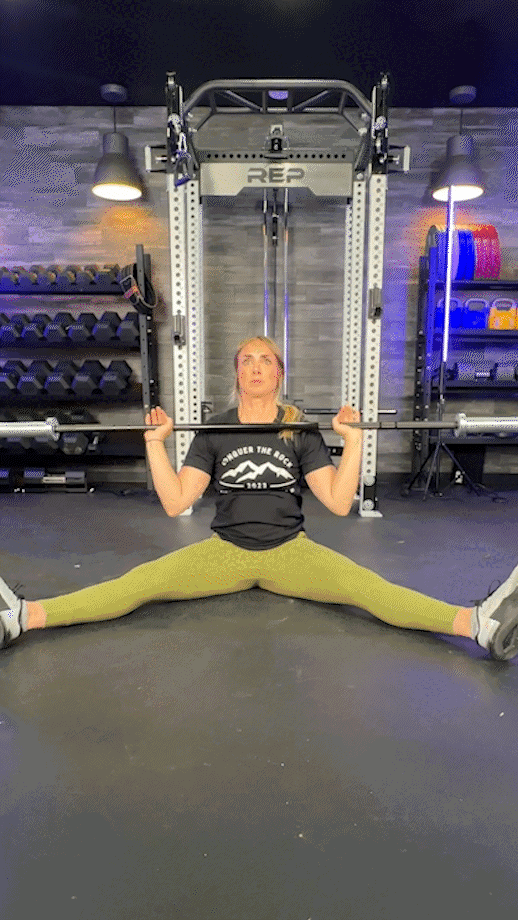
Push Press: FAQs
What does the push press work out?
The push press is a full-body exercise that trains the lower and upper body in one fluid movement. The lower body muscle groups trained by the push press are the quads and glutes. The upper body muscles trained are the triceps, chest, deltoids, and upper back.
What is the difference between push press and strict press?
The strict press is an overhead press variation where only the upper body muscles are used to press overhead, while the push press uses a lower body dip to assist in pressing weight overhead with momentum.
Should I start with push press or overhead press first?
Both are great exercises to start with when you are a beginner if your shoulder mobility allows you to press overhead with compensation. The overhead press is an excellent foundational exercise for building strength, and the push press can help build power.
How many reps for push press?
The reps performed for the push press depend on your goals. Performing between six to 12 reps for three to four sets works well if your goal is to build muscle. If you’re looking to build your overhead strength, four to five sets of three to five reps is a great start.


